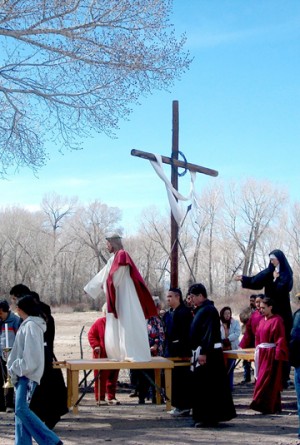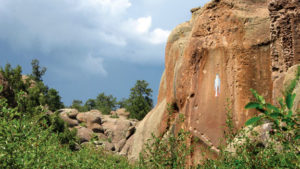by Ed Quillen
One way to meet good people in Central Colorado is to do something stupid. I learned that atop Kenosha Pass on the afternoon of February 5.
Martha and I were on our way from Salida to Longmont, where we were supposed to go out to dinner with my brothers and their wives, along with my parents, to celebrate my parents’ 60th wedding anniversary (in case you’re curious, I was born nine months and one week after their wedding).
Since driving at night has become something of a challenge for me, we left around noon to be sure of a daylight arrival. We took our dog Bodie with us, even though he’s not a good traveler. He’s a car-chasing idiot, and when he rides in the camper shell, he sees plenty of cars to “chase” by running around in circles and barking a lot.
You get used to it, up to a point. When you reach that point, you get off the highway to some convenient spot where the dog can run around without seeing any highway cars to chase. In the summer, there’s a network of suitable back roads on the north side of the summit of Trout Creek Pass, and a similar configuration on the east side of the summit of Kenosha Pass.
On this sunny winter day, the Trout Creek road looked too snowy, so we didn’t stop there. There was snow atop Kenosha, too, but the side road was hard-packed and shouldn’t be any trouble for my four-wheel-drive pickup.
Perhaps predictably, the hard-pack ended after about 100 yards, and though Martha said we’d gone more than far enough, I foolishly persisted, thinking that this was just a little drift and soon we’d be back on the hard stuff.
You can surmise what happened next. All four wheels were down deep in the snow, pretty much to the axles, and four-wheel-drive just meant more wheels to spin uselessly.
There was a time when I traveled with chains and shovels and come-alongs and the like, but these days I figure I’m better off with a cell phone and my AAA membership. Of course, I hadn’t brought the cell phone.
We were stuck in plain sight of the highway. While Martha walked Bodie in the woods, two women in an SUV started driving toward us on the side road. I waved them down and advised them not to go any farther unless they wanted to be stuck like us.
I also asked if I could borrow a cell phone to call AAA. No problem except, as we discovered after trying both their phones, there is no cell service atop Kenosha Pass.
That seemed odd. When we had this magazine and I read the Fairplay Flume regularly, there were frequent stories about installing cell towers in Park County, many of them concerning how to disguise a cell tower so it looked historic and rural. There was even a big tower that looked neither historic nor rural on the hill above that RV park south of Fairplay.
Anyway, it wouldn’t have done me any good to have the cell phone, so I felt better about not bringing it along.
The women said they were on their way to Denver, and they’d call AAA on my behalf when they got down to Bailey where their phones worked.
I walked back to our stuck pickup, arriving there about the same time as Martha and Bodie. It was a bit chilly and windy, but not really that bad, especially in the cab. We could just wait for the tow truck — assuming that the women had made the call, and that there was someone nearby to respond to it. I found myself worrying about having to spend the night up there.
After an hour or so, the waiting got old. I got out to stretch, and saw another vehicle headed our way — a 1989 Jimmy with two fairly young guys in front. In back, I soon discovered, were two small children. The young father and his friend were going to visit the kids’ grandparents in Buena Vista, he said, and he seemed eager for the challenge of pulling us out. “We’ve got chains and shovels in back,” he said.
His friend nodded. “That’s because we get stuck all the time. He loves these back roads.”
I warned that they’d get stuck this time if he drove much closer to our truck. And that’s what happened, since he wasn’t much better at following good advice than I had been. His Jimmy was quite a bit heavier than my Ranger, and so he didn’t get nearly as far before bogging down.
They had shovels. Martha got an old rug out of the back of our pickup and laid it behind one of their tires. With some pushing and digging, we got them out. They’d be glad to give us (including Bodie) a ride down to Jefferson, where they were sure we could find somebody to get us out. Might as well try that, rather than wait for a tow truck that may not have even been summoned.
As a railroad buff, the main thing I’d ever noticed about Jefferson was its old depot, still in good repair 72 years after the narrow-gauge tracks were removed. Perhaps 25 years ago, I’d stopped at its general store for some road coffee, and it was so bad then that I’d never stopped there again even though ownership had changed several times.
Into the general store I went, explaining to the woman at the counter that I was stuck up on Kenosha Pass. “Are you ‘broke stuck’ or ‘stuck stuck’?” she asked.
It took me a bit to figure out what she was asking. “Stuck stuck,” I said. A guy pointed out the window at a big 4WD pickup. “Will that get you out?”
“If you’ve got about 200 feet of chain,” I said. “Or a winch with plenty of cable.”
“Guess that won’t work then.” He took me to the gas station next door, where we found his friend clearing off some snow with a little Kubota tractor that had a front-end loader. “This’ll get you out,” he said. “I guarantee it.”
They seemed quite familiar with the process of rescuing drivers from their own stupidity. The cost would be $75 and I’d have to sign a release form. I had my pen and credit card out in a flash. He put the tractor aboard a trailer and up the pass we went.
When we got there, the rescue truck from Bailey had just arrived. It wasn’t a regular tow truck; it was more a “haul truck” with a tippable flat bed and a winch. The driver feared getting himself stuck if he got close enough to reach my pickup with the winch cable, so it was just as well we’d hitched a ride to Jefferson.
The driver said he’d stick around, just in case. I filled out the AAA paperwork while the two Jefferson guys started digging and pulling with the tractor.
Maybe it had been a slow day in Jefferson and they were bored, because they seemed to relish the challenge. In about 20 minutes, my pickup was next to dry pavement and I shook hands all the way around and thanked them all.
We got to Longmont just as my kinfolk were leaving the dinner, but we did get to congratulate my folks on their anniversary, and attend a family reception the next day. And on the way, I met some great people. On future trips to and from civilization, I plan to stop for coffee and road food in Jefferson, a place that was there for us when we needed it. And also I’ll listen to Martha when she says “I don’t like this. Let’s back out of here now.”
Ed Quillen has been getting stuck in the mountain mud, snow and rocks for about 40 years. He lives in Salida, where he helped found this magazine in 1994.

